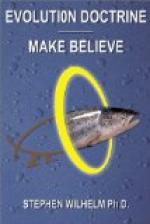The fundamental point from which the doctrine of natural selection proceeds is the fact that all creatures are more or less perfectly adapted to the circumstances which they must meet in carrying on their lives; this is the reason why so much has been said in earlier connections regarding the universal occurrence of organic adaptation. An animal is not an independent thing; its life is intertwined with the lives of countless other creatures, and its very living substance has been built up out of materials which with their endowments of energy have been wrested from the environment. Every animal, therefore is engaged in an unceasing struggle to gain fresh food and new energy, while at the same time it is involved in a many-sided conflict with hordes of lesser and greater foes. It must prevail over all of them, or it must surrender unconditionally and die. There is no compromise, for the vast totality we individualize as the environment is stern and unyielding, and it never relents for even a moment’s truce.
To live, then, is to be adapted for successful warfare; and the question as to the mode of origin of species may be restated as an inquiry into the origin of the manifold adaptations by which species are enabled to meet the conditions of life. Why is adaptation a universal phenomenon of organic nature?
The answer to this query given by Darwinism may be stated so simply as to seem almost an absurdity. It is, that if there ever were any unadapted organisms, they have disappeared, leaving the world to their more efficient kin. Natural selection proves to be a continuous process of trial and error on a gigantic scale, for all of living nature is involved. Its elements are clear and real; indeed, they are so obvious when our attention is called to them that we wonder why their effects were not understood ages




